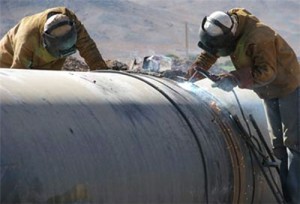 TEHRAN � Iran�s oil exports are being ravaged by sanctions, but there are signs under the new president, Hassan Rouhani, that efforts to attract old clients may be boosting the country�s most essential economic lifeline.
TEHRAN � Iran�s oil exports are being ravaged by sanctions, but there are signs under the new president, Hassan Rouhani, that efforts to attract old clients may be boosting the country�s most essential economic lifeline.China, India and Japan, which together account for half of Iran�s oil exports, have increased their purchases over the past several months, offering some hope to Iran and complicating U.S.-led efforts to put pressure on the country over its disputed nuclear program by attempting to cut off its main source of income.
Under the U.S.-led sanctions, some importers of Iranian crude have been granted short-term waivers to continue buying if their imports demonstrate significant declines during six-month intervals. China, India and Japan received such exemptions.The flow of oil is vital to Iran as oil exports make up nearly half of its revenue.
Overall, the�International Energy Agency(IEA) reports that Iran increased its oil exports by 180,000 barrels per day in September over the previous year, a 26�percent increase. But the monthly total of 1,170,000 barrels per day still represents a far cry from what industry insiders and analysts say is possible.
Although Iran holds the fourth-largest proven oil reserves in the world, the increasingly rigorous sanctions imposed on the country over its nuclear program have exacted a significant toll. Under the sanctions, some imposed by the United Nations and others by the United States and its allies, Iran�s oil revenue last year dropped to less than half its level in 2010, and the oil output fell last year to its lowest level�since 1986, when the country was in the midst of an eight-year war with Iraq.
Iranian officials acknowledge the extent of their difficulty.
�The great problems we face today in production, exports and purchase of commodities in the petroleum industry have never been like they are today,� Iran�s oil minister, Bijan Namdar Zanganeh, told a gathering of industry officials Tuesday.
Although the sanctions continue to cut deeply into Iran�s oil revenue, efforts by Rouhani and his cabinet have begun to fuel hopes that the country could begin to find a way out.
Under the sanctions, China, Iran�s biggest buyer, is supposed to reduce its intake by 5�percent by the end of the year if it is to qualify for a new waiver. Instead, China�s imports of Iranian oil are on the rise, up 1.4 percent this year compared with the previous year, according to IEA figures.
In September alone, Chinese imports of Iranian oil jumped by 24 percent compared with the same period last year. China still relies on Iran for about 10 percent of its crude imports.
Some Iranians have begun to express hope for a deal between Rouhani and the West that might even lead to a lifting of sanctions, opening the way to new investment by international companies and to renewed exports.
Zanganeh said recently that Iran hopes to �take advantage of the power of oil�� in seeking broader access to international markets.
If sanctions are lifted, exports could reach 3.5�million barrels per day within a year, economist Saeed Laylaz said. Within two years, �we can reach the record levels we had during the Khatami period of 4.2�million barrels per day,� he added, referring to former Iranian president Mohammad Khatami.
For Iran to have any hope of returning to pre-sanctions export levels, however, it will have to appeal to more than just its longtime customers in Asia, where the international sanctions have prompted countries to diversify imports to become less dependent on Iran.
At the same time, India has sought recently to pay its oil debts to Iran in rupees rather than in dollars, an arrangement that Tehran is not eager to accept at a time when Iran�s foreign currency reserves are quickly dwindling.
For that reason, Iran is looking west for oil partnerships.
Turkey, an important customer, buys 100,000 barrels per day from Iran, and officials there say they are willing to buy more if it is available.
The European Union, which completely halted oil imports from Iran in July 2012, also seems poised to reenter the market, with 10 member states receiving sanctions waivers last month. There are no statistics about exports to those countries, but Italy, Spain and Greece traditionally imported large volumes of Iranian oil.
Laylaz said Tehran thinks that international oil companies such as France�s Total are eager to return to Iran and might influence Western governments to respond positively to Rouhani�s quest for an easing of sanctions.
According to Western diplomats in Tehran and industry officials, international oil companies that once had a presence in Iran are negotiating with the new government to return, and several European companies have sent delegations to explore oil opportunities.
�A large number of traditional buyers of Iranian crude oil are making the preparations for raising their crude oil purchases from Iran,� Mohsen Qamsari, director of international affairs for the National Iranian Oil Co., said last week in an interview with Shana, a news agency dedicated to the domestic energy sector.
By The Washington Post
The Iran Project is not responsible for the content of quoted articles.










